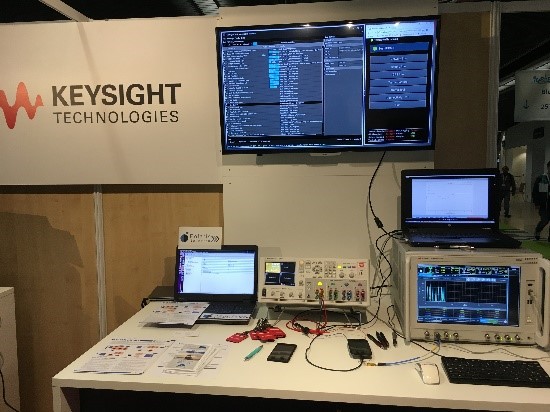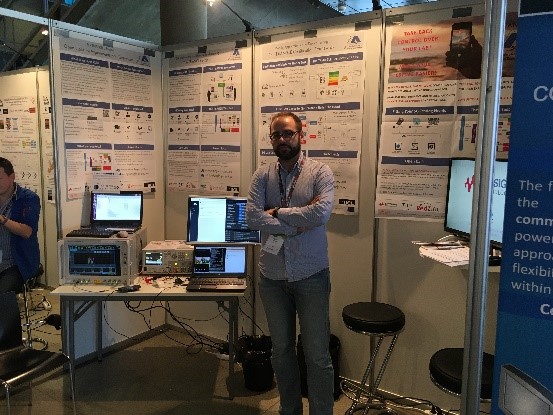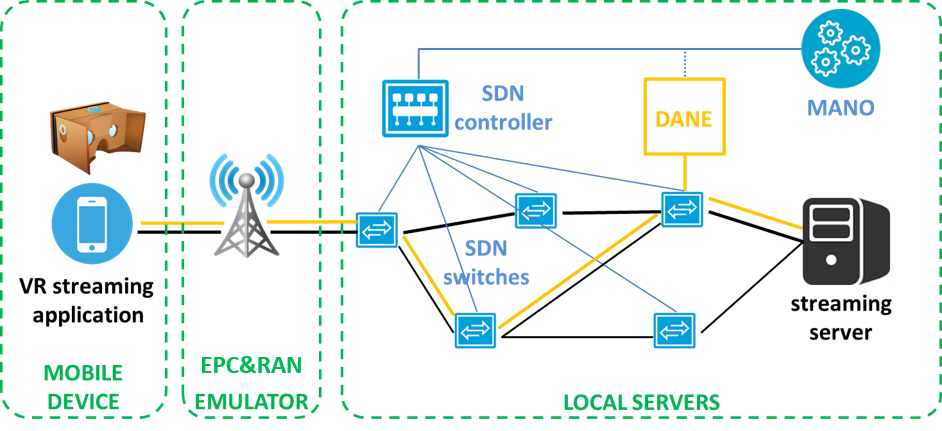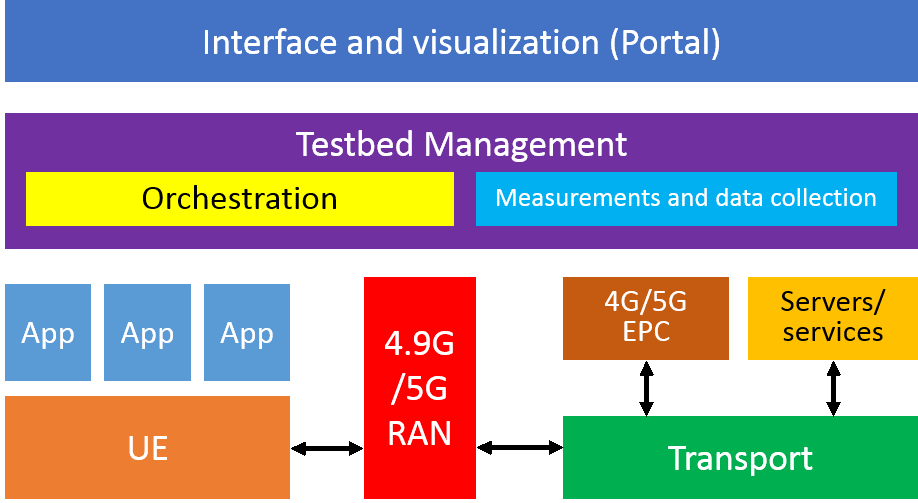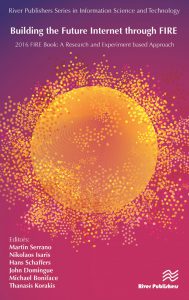 River Publishers has made available a book focusing on the research and experimentation on the Future Internet from the FIRE community. The book contains a chapter on TRIANGLE and how it will provide advanced benchmarking for applications and devices for the upcoming 5G networks. The book is available for free at River Publishers website.
River Publishers has made available a book focusing on the research and experimentation on the Future Internet from the FIRE community. The book contains a chapter on TRIANGLE and how it will provide advanced benchmarking for applications and devices for the upcoming 5G networks. The book is available for free at River Publishers website.
Deliverable D2.2: Formalization of the certification process, requirements and use
The TRIANGLE project has produced a deliverable D2.2 and appendices, to define a certification scheme for TRIANGLE project. You can also find it in the deliverables page.
TRIANGLE testbed demonstrated at ICC in Paris
TRIANGLE demonstrated the features and capabilities of the first release of the testbed at the International Conference on Communications (ICC) in Paris, France. The TRIANGLE demonstration was hosted at the Keysight Technologies booth and focused mostly on the testbed.
Three main testbed features were in the spotlight and attracted a lot of attention:
• The truly end-to-end testing capabilities given by the S1 interface and the commercial Evolved Packet Core
• The ease and effectiveness of the testbed and tests orchestration, including mobile apps and measurement tools
• The availability of synchronized measurements across the testbed
TRIANGLE Booth at EuCNC 2017 in Oulu, Finland
The TRIANGLE Project hosted a booth at the European Conference on Networks and Communications (EuCNC) in Oulu, Finland respectively. At EuCNC we provided a sneak peek into the soon-to-be-released test and certification framework. This new line didn’t pass unnoticed, providing a base for exciting discussion with experts and potential participants to the ongoing Open Calls. The effective working of new 5G applications and services is paramount in a global competitive marketplace and the standardized TRIANGLE testing and certification scheme can help achieve this.
TRIANGLE Booth at EuCNC 2017
The unique testbed features shown were:
• The truly end-to-end testing capabilities given by the S1 interface and the commercial Evolved Packet Core
• The ease and effectiveness of the testbed and tests orchestration, including mobile apps and measurement tools
• The availability of synchronized measurements across the testbed
The TRIANGLE Certification Process
TRIANGLE has now formalised its certification process, defining its requirements and how the process is used. This certification process has been documented (in a document called Deliverable D2.2) and describes how a 5G application developer, device maker or operator can go about acquiring the TRIANGLE mark certification.
TRIANGLE firstly reviewed existing certification schemes in the mobile world, focusing on the specific stipulations and certification process of each scheme. Based on both this study and requirements specific to the TRIANGLE 5G testbed, the certification requirements and process were defined to explain to vendors how to obtain the TRIANGLE mark for their 5G products.
TRIANGLE also includes the Test Specifications (description of the tests that will be run on the products) relevant to 5G systems and other certification information such as the product scoring process in the D2.2 document.
Second Wave of TRIANGLE Open Calls Now Open!
The TRIANGLE project held its first set of Open Calls towards the end of 2016. We are now proud to say the second wave of open calls for experiments and extensions are now open. These Open Calls or funding round, are aimed at 5G operators, device manufacturers and applications developers wishing to test and benchmark on a ready made 5G testbed as well as those companies and institutions who might wish to extend the testbed with their own set of capabilities.
Do you have a mobile app, a mobile device or an IoT device, a service provisioning system, a RAN or network component that would benefit from testing or receiving a professional-grade certification of 5G readiness?
Funding of up to 20.000€ per experiment is available if you have a mobile app, mobile or IoT device, or service provisioning system you would like to experiment with and test on a 5G end-to-end network using the latest technological advances in wireless networking, and up to 100.000€ is available if you have a RAN or other network hardware/software component and you wish to incorporate into our test bed so that the testbed is further enhanced. You can also avail of a Triangle certification or benchmark for your application or device.
You can apply for funding through our Open Call process between May 8th 2017 and July 9th 2017. Successful applicants will be informed by the end of August 2017 and experiments will start from October 1st 2017 .
You can contact us at any time during the entire process for assistance or for a pre-evaluation of your ideas and needs.
Click here for further information on the Open Calls for Triangle project.
Triangle mentioned as an initiative to be built on in UK 5G strategy
The UK government recently released it’s strategy for supporting the rollout of 5G, this includes provisions for funding to support testbeds, and other support initiatives. The strategy lists a number of ongoing initiatives that the government will collaborate with, and build upon, to achieve it’s strategic goals.
One of these initiatives that was specifically mentioned in the report was Triangle, mentioning specifically the benefits for application developers and device manufacturers for testing and benchmarking new mobile applications.
Triangle can contribute to this strategy by helping the government to build the case for 5G by supporting industrial engagement with SMEs, outlining new business models and opportunities for innovation that are enabled by 5G.
More details are available from full report.
TNO adds NFV and Streaming Optimization Capabilities to the TRIANGLE testbed
The expected ability of 5G network to deliver advanced, chained services for multiple tenants in the on-demand way will introduce an unavoidable complexity. To assure meeting the high bandwidth and low latency targets, 5G is foreseen to be largely a softwarized network, using advanced MANO functionalities. Any testbed which wants to offer realistic conditions for 5G test needs to provide experimenters with the ability to orchestrate real-time network and cloud resources for 5G services.
As winner of the first round of Extension Open Call, TNO, a Dutch leading research center in networking and communications, will implement a Network Functions Virtualization basic infrastructure within the TRIANGLE testbed, opening the doors to new types of testing and experimentation. The TNO extension will target on service testing and network optimization testing, with a stronger focus on Mobile Network Operators support.
The extension will allow the TRIANGLE testbed to offer to its users the ability of running experiments orchestrating the management of programmable 5G networks. The extension will also integrate management and assistance of VR streaming apps tightly within the 5G network, by introducing in the TRIANGLE testbed a novel network element (called DANE) implementing the upcoming MPEG DASH SAND standard. By programming the MANO to coordinate the usage of SDN resources and the streaming app behaviour, the solution will yield higher network efficiency and superior application QoS.
New exciting features in the TRIANGLE testbed
After months of work and preparation, the TRIANGLE testbed now has a set of exciting new features for our experimenters.
This release of the testbed features a user-friendly, web-based interface that allows App developers to manage their own applications, while configuring and running experiments and campaigns with an initial set of pre-defined network configurations. While the functionalities of the web interface are still in the development phase, including a result viewer now enabled for a basic set of raw data, behind the hood runs a powerful orchestration and scripting engine that the experimenters can have access to, if needed, with the help and support of the TRIANGLE team.
The testbed, powered by a 4G Rel’12 LTE eNB emulator, a Rel’8-compliant S1 interface, and a 4G Rel’12 Evolved Packet Core, enables experimenters to test Applications on a small device cloud, measuring a set of performance characteristics including a time synchronized device power consumption. This is a particularly interesting capability when combined with the support for LTE Rel’13 Cat.M2 devices support, i.e. the new cellular IoT 3GPP standard.
More exciting features are in the pipeline for the next version of the testbed, with a release date of October 1st 2017. The Release will be then available to the winners of the newly launched Open Call OC3.
Release 2 of the testbed will have an increased degree of automation, allowing the App developers to choose from an increased number of network scenarios and pre-specified test cases. The testbed will allow the experimenters to enjoy the broad bandwidth of a 5G-like heterogenous connectivity, a bigger device cloud, and the possibility to benchmark against a set of reference applications, such as Facebook, YouTube, Spotify. The presence in the testbed of a robotic arm and a GPS signal emulator will enable the testing of Virtual and Augmented Reality applications, while the development of an analytics engine will facilitate the evaluation of QoS and QoE metrics, providing aggregated, user-friendly metrics. The network side will also be upgraded towards 5G with a Rel’13 compliant S1 interface, a Virtualized Network Function testing support, and dynamic, QoE-driven, QoS profiles. The virtualization of the network component will also allow the dynamic emulation of transport network-originated imperfections.
Diverse mix of applications for first TRIANGLE Open Calls
The TRIANGLE project held its first set of Open Calls towards the end of 2016. These Open Calls or funding round, were aimed at 5G operators, device manufacturers and applications developers wishing to test and benchmark on a readymade 5G testbed as well as those companies and institutions who might wish to extend the testbed with their own set of capabilities. Resulting from this, there were a number of applications from a diverse set of countries across the EU and an interesting mix of sectors.
The successful applicants had proposals in the areas of medical home care using connected devices, augmented reality tourist applications and streaming media. The extension selected will bring lots more capacity to the testbed for testing media streaming Use Cases. A noteworthy observation on the applications was that, Greece in particular, seems to be a popular 5G hotspot of innovation! It has been very exciting to see what a number of small businesses are planning to develop with a 5G testbed. As expected the potential use cases are aligned with the 5G Use Cases identified in the NGMN whitepaper, and cover both mobile applications and hardware devices.
To outline some of the other areas of 5G Innovation, some of the non-successful applicants were proposing drone control, artificial intelligence for video stream analysis and many other fascinating areas. The project hopes to continue to receive a diverse set of proposals in the future Open Calls. (more…)


